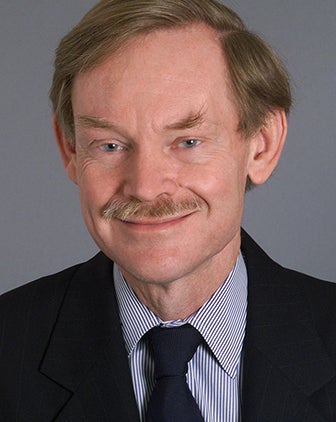
Subscribe to Pittwire Today
Get the most interesting and important stories from the University of Pittsburgh.Event Recap: A History of American Diplomacy
One of our country’s leading foreign policy practitioners shared his views on the traditions that have helped shape American diplomacy.
Robert Zoellick, who has served as deputy secretary, under-secretary and counselor in the State Department as well as president of the World Bank, is the author of “America in the World: A History of U.S. Diplomacy and Foreign Policy.” He was the guest in the American Experience Distinguished Speaker Series, hosted by the Dick Thornburgh Forum for Law and Public Policy and the University Honors College.
During the April 7 event, Zoellick outlined five main traditions that can be drawn from American diplomatic history—the importance of North America, the roles of trading and technology in establishing ties with others, the role of alliances, the importance of congressional support, and the belief that American policies should serve a larger purpose.
In an interview conducted by Pitt Chancellor Emeritus and Thornburgh Forum Director Mark A. Nordenberg, Zoellick talked about leaders like Benjamin Franklin, who he said was a skillful negotiator who knew that diplomacy was about timing—that is, knowing when to act and when not to.
Zoellick also praised the work of President George H.W. Bush and his Secretary of State James Baker, who used their diplomatic skills during the end of the Cold War to hasten the dissolution of the Soviet Union. Zoellick said Baker, whom he worked under for eight years, was always focused on results: It wasn’t about what you could say, but what you could accomplish. He said Baker was quite comfortable with the power of the United States but didn’t overuse it. Zoellick called it a way of using American power, but with restraint.
“I have always found that to be the best combination, because there’s always a sense that there is something else in reserve,” he said. The key, he said, is to concentrate on core issues while listening to your partners and treating them respectfully. “That way, you can often compromise on secondary questions that bring people along, while the U.S. still achieves its major purpose,” he said.
The author also told the audience about another figure who realized the importance of science and technology in foreign affairs—engineer and inventor Vannevar Bush, who headed the Office of Scientific Research and Development during World War II and oversaw new developments in radar and other tactics. He also helped develop new offensive actions to wipe out the U boats, which, prior to that, had been severely attacking U.S. convoys.
Bush wrote a 1945 essay for The Atlantic titled “As We May Think,” in which he described a memex, a machine for cross-referencing and retrieving information. A later reprint of that essay would go on to inspire the invention of the personal computer.
“Bush thought one of America’s strengths was its independent thinkers, its mavericks, its innovators,” said Zoellick. He said Bush also believed that government support for basic research in American universities was a key to the country’s progress.
Zoellick’s love of history propelled him through his career, as he combined it with economics, finance, law and organizational behavior. He said history helped him formulate questions.
“People overseas find that Americans don’t know very much about the rest of the world. You can score huge points by simply knowing enough to ask questions,” he noted.
His advice for younger people: Pick your boss. By that, he means to associate with people you can learn from. Don’t think about what you want. Think about what you can do to help them perform better.
He admitted he senses cynicism in some college students of today. But he said they have the potential to make a difference.
“Whether it’s in the public sector, nonprofits or private enterprise, the ability to contribute is huge,” he said.
A recording of the discussion will be available next week on the Dick Thornburgh Forum website.


